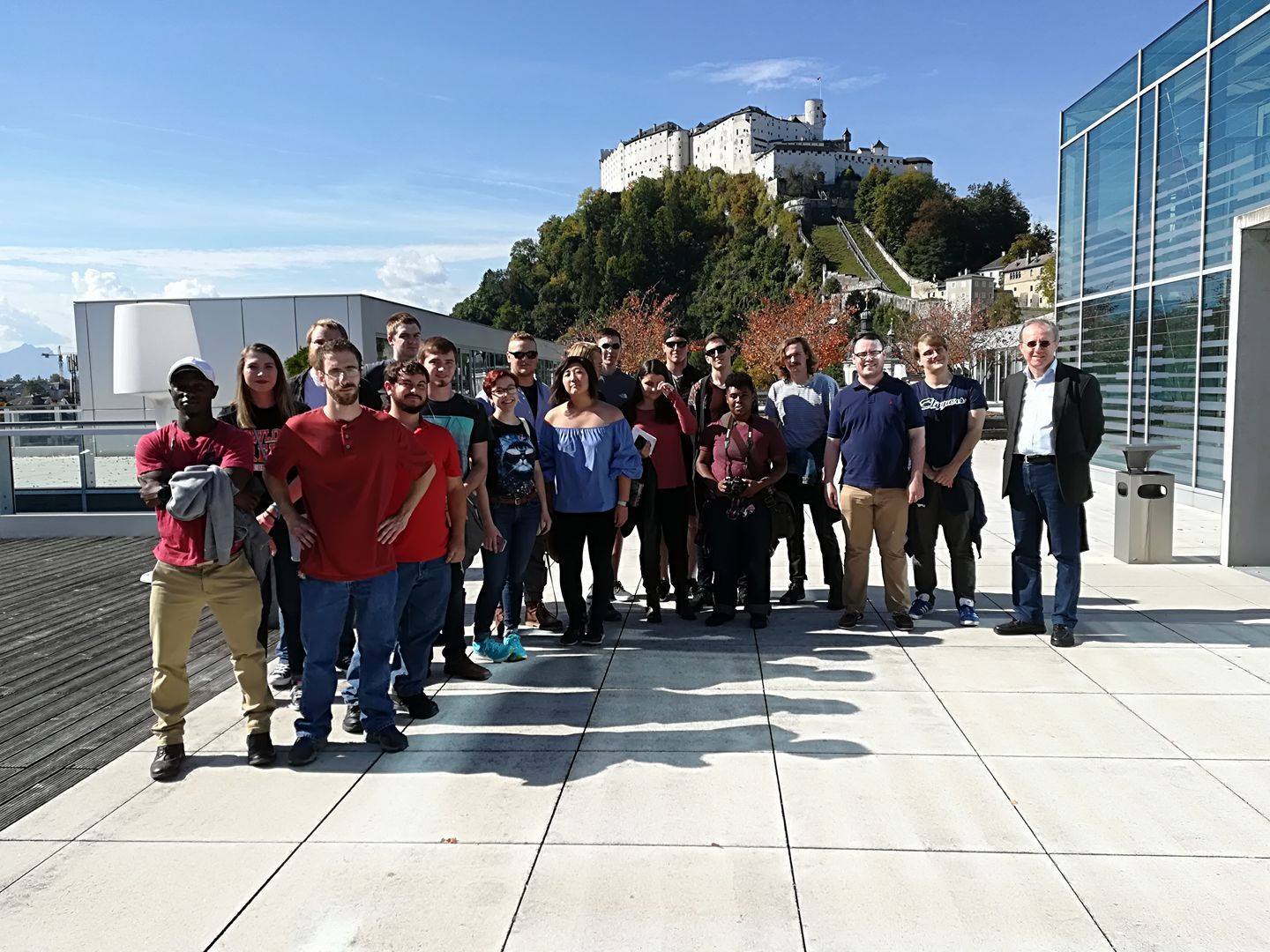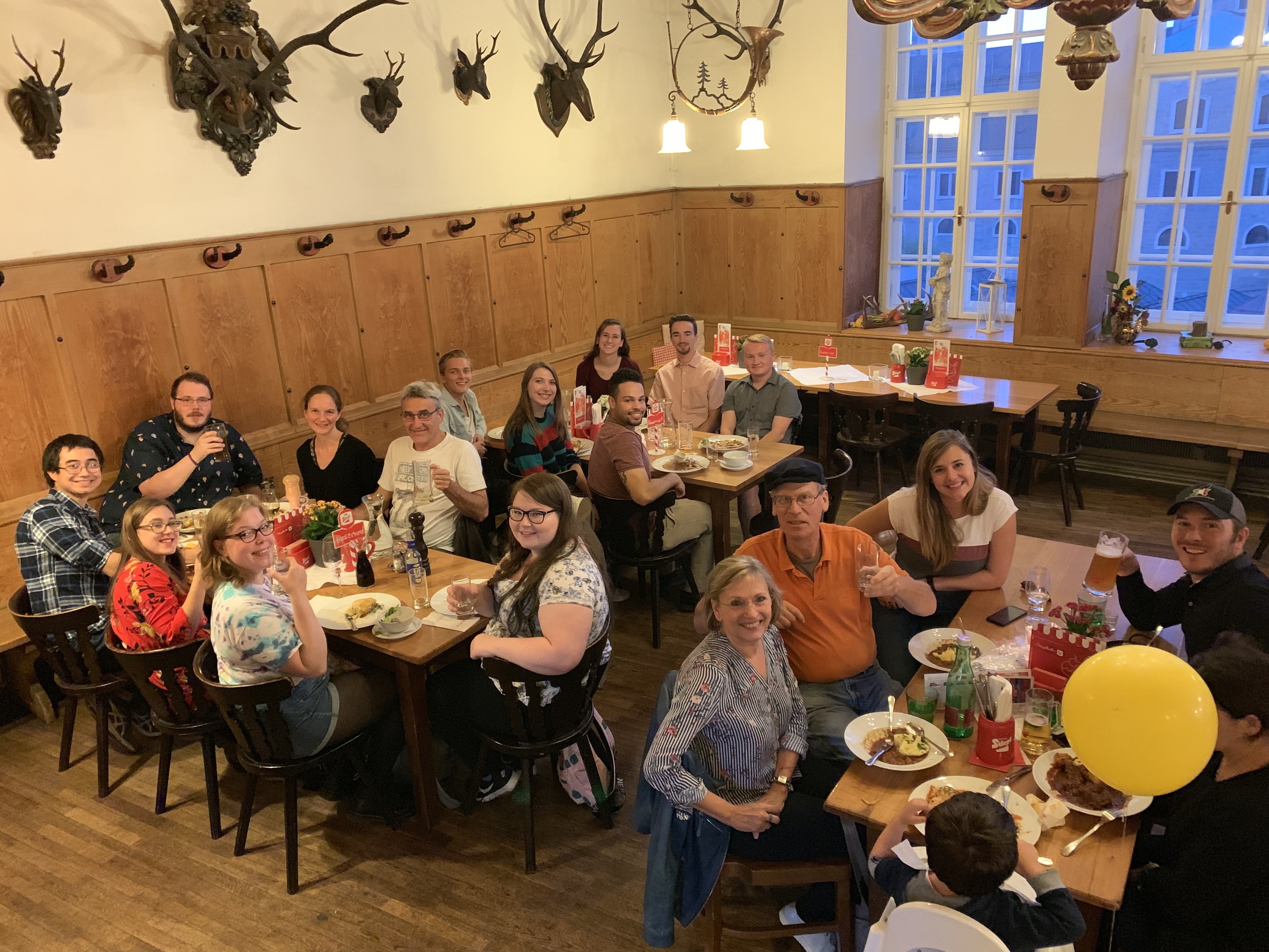
Bachelor of Science (B.S.)
Minor
German
The BGSU German program, available as both a major and minor, explores the language, culture and society of the 100 million German-speaking people across the globe.
German is an international medium of commerce, science and travel. At least one in five Americans have German-speaking ancestors.
A gateway to careers in international business, tourism, diplomacy, culture and literature, fluency in German can increase employability, global perspective and familial connections.
100% of German graduates report they’re employed, in graduate school or starting a business within six months of graduation.
Career - what can you do with a German degree?
German language skills help students become more marketable. These skills apply directly to teaching, translating, and related areas such as publishing, media, travel and tourism.
Combining knowledge of the German language and culture from a minor with a major in another subject like business or international law provides even more career possibilities. Career choices for bilingual graduates include government service, business and banking, communications, science and technology, music and fine arts jobs. Education-related jobs are also available across the world.
Graduates work as career counselors, language media specialists, translators, interpreters, congressional aids, foreign service officers, political advocates and NGO programs officers.
Graduates may take positions with international businesses or law firms, while others work in European tech and automotive industries. Some graduates further their education by pursuing advanced degrees.
Career paths
- International executive search consultant
- State Department diplomat
- Certified travel agent
- Technical translator
- Automotive industry executive
- International banking investor
- Intelligence analyst in European Affairs
- Museum curator
- Educator
Quick Facts from the Bureau of Labor Statistics
More than half the world is bilingual
Aside from the many benefits of a second language – social, neurological and cultural – the career options available for German-speaking graduates are extensive.
Business, international law, cultural or diplomatic positions, and teaching are just some of the options available. Why German, though? The economies of German-speaking countries (the Federal Republic of Germany, Austria, Switzerland, Luxembourg and Liechtenstein) are central to the European Union and the rest of the world. Over 100 million people in the world speak German.
Germany is a top investor in the U.S. With German-owned or multinational companies operating in Germany and the U.S., bilingual students can flourish with German language skills.
Germanic contributions in music, philosophy, natural sciences, literature and the visual arts have enriched world culture.
The BGSU German program is a vibrant, in-depth program with deep connections to institutions across the German-speaking world and German culture.
Language skills can be a significant competitive advantage as employers seek professionals who can communicate seamlessly with customers in new and expanding overseas markets.
Curriculum
The flexible German program meets the needs of majors and minors and those who simply want to learn the language. The curriculum promotes active use of German as students move from elementary to advanced levels in three main areas: language, culture and literature.
German language skills and cultural competence are improved by studying political, economic and social systems, comparative patterns of daily life, German/Austrian popular culture and film, environmental issues, race matters, the revolution in East Germany, and the unification process. Additional topics in many classes are through curriculum needs or student requests.
A reading and translation sequence of courses enables students to apply German in specialties such as international studies, business and the sciences. A drama workshop, linguistics and business German (offered in Salzburg, Austria) improves professional language skills.
Culture courses explore society in German-speaking countries and their past and present contributions to art, philosophy, music, film, science and German-American culture. Literature courses teach reading skills and cover critical creative works.
Students with high school German can place out of some courses and achieve a major or minor more quickly. Students who wish to teach German can earn a Bachelor of Science in Education degree with a major in German.

Sample courses
- German Culture and Civilization
- Contemporary Germany
- German Language and Culture
- German Literature
- German Drama Workshop
- Vienna @ 1900: Culture and Society
- Women and the Third Reich
- Fascism in Europe: Then and Now
Study Abroad and Other Opportunities
Immersing yourself in the culture of German-speaking countries is the best way to practice your language skills and explore opportunities for work or further study abroad.
BGSU offers several study abroad options for German majors or minors, Fulbright fellowships, DAAD Fellowships, Congress-Bundestag Youth Exchange Program, and CDS internships.
The department also sponsors the University’s respected Academic Year Abroad (AYA) program in Salzburg, Austria. The program is open to all students with four semesters of college German and carries a full year’s academic credit.
A BGSU faculty member supervises the year abroad, courses are taught in German, and students live with Austrians in dormitories. Qualified music students may attend the Mozarteum, Salzburg’s well-known conservatory. Summer programs in Salzburg are also available.
The program has been operating since 1968 when a one-way flight from Luxembourg to New York with a student discount cost $135! Alumni of the AYA program still living and working in Salzburg often visit to speak to BGSU students to talk about their experiences integrating into German workplaces.
Another exchange program with a number of German universities enables two or three students a year to study with full scholarships.
The Mozarteum - Salzburg
Limited space is available at the Mozarteum University of Music for qualified BGSU music students. Any participant in the Salzburg program can usually arrange to take lessons at this Salzburg institution and will also find ample opportunity to participate in singing groups or ensembles. Mozarteum courses – usually one or two per semester – may be taken in addition to a regular undergraduate program of studies.
For more information, please contact the BGSU Salzburg Program Coordinator.
Joseph L. Gray III Scholarship
The Joseph L. Gray, III German Scholarship awards up to $500 to an incoming freshman from Ohio who has declared a major in German. The application for this scholarship is available at Academic Works.
German Club
German Club is open to students who have an interest in any aspect of the German-speaking world. Whether it's the language, music, Oktoberfest, sports cars, pretzels and other food, German business, anything and everything German (and Austrian and Swiss) is welcome at German Club.
The Global Village Learning Community
This internationally-minded learning community consists of international and American students from all majors who have a sincere interest in meeting and learning about people from other countries and cultures.
Residents are paired with students of different cultural backgrounds and share a living space. This unique and dynamic community is fueled by cross-cultural conversation, fun times, friendship, and moments of discovery.
Max Kade Foundation - Writer in Residence Program
Each year the Max Kade Foundation helps bring a German-speaking writer, scholar or artist to teach at BGSU. In addition to public readings, the writer ordinarily teaches a course on contemporary literature for advanced undergraduate and graduate students.
Klaus Schmidt founded the writer-in-residence program at BGSU in 1986 with the help of German-American philanthropist Max Kade and his foundation.
The German program is part of the Department of World Languages and Cultures in the BGSU College of Arts and Sciences.
Updated: 05/17/2024 12:16PM

